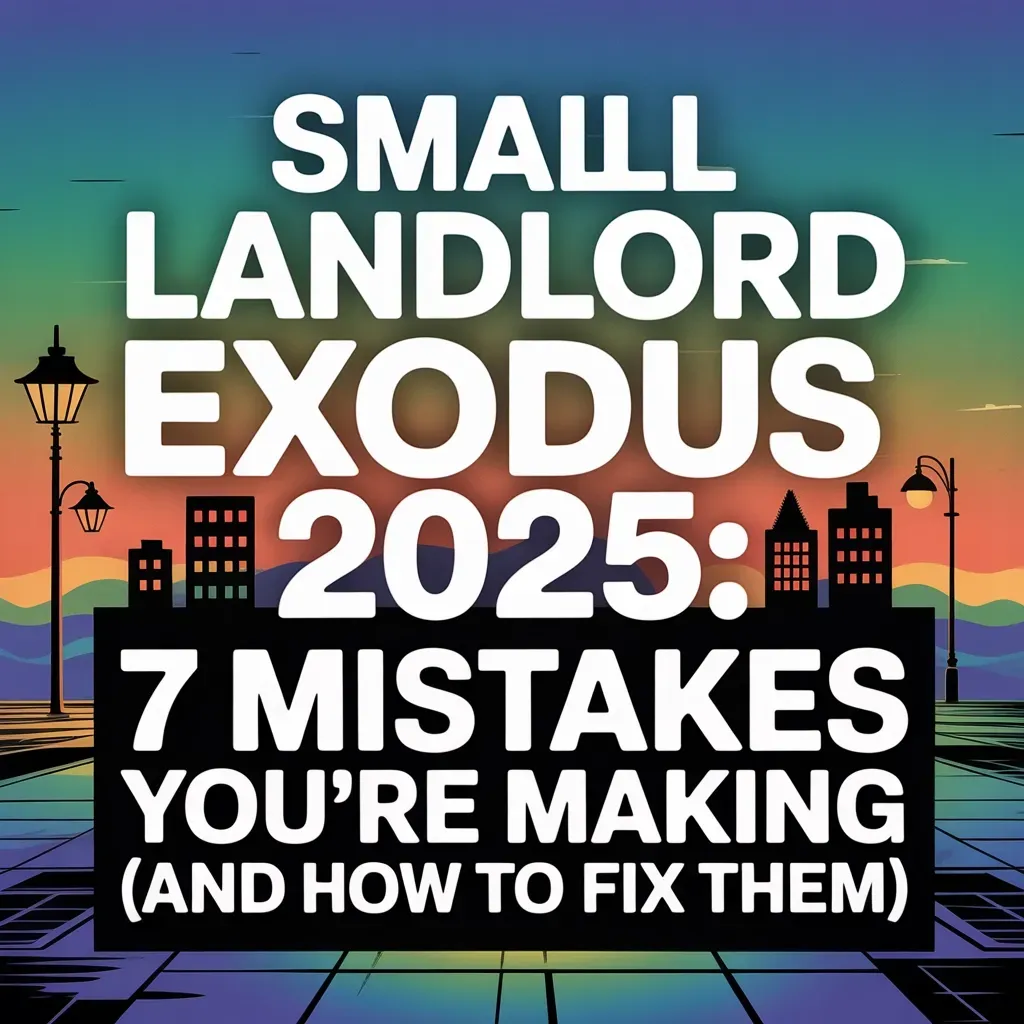
Small Landlord Exodus 2025: 7 Mistakes You're Making (and How to Fix Them)
Small Landlord Exodus 2025: 7 Mistakes You're Making (and How to Fix Them)
The rental market is witnessing an unprecedented shake-up in 2025, with small landlords abandoning traditional letting in droves. But here's what most don't realize: while thousands are running for the exits, smart property investors are quietly pivoting to short-term rentals and discovering a goldmine they never knew existed.
The numbers tell a stark story. 15.6% of all new property instructions in Q1 2025 were previously rented homes – nearly double the 9.8% from the previous year. Of the 451,154 new property listings, approximately 70,542 were former rental properties, with only 2.9% subsequently re-let as traditional rentals. The rest? Gone from the rental market forever.
But this exodus isn't just about market forces – it's about landlords making seven critical mistakes that are costing them thousands in lost revenue and pushing them toward panic selling.
The Real Reason Behind the Landlord Panic
The government's Renters' Rights Bill has traditional landlords spooked. Scrapping fixed-term tenancies, eliminating Section 21 'no-fault' evictions, and piling on regulatory red tape has created a perfect storm. 93% of letting agents report concerns about losing independent landlord clients, with 70% saying landlords have already sold properties in the past year.
Meanwhile, savvy investors are discovering that short-term rentals offer everything traditional letting doesn't: higher yields, flexible control, and protection from problematic tenant legislation.

Mistake #1: Not Exploring Short-Term Rental Income Potential
The biggest mistake landlords make is assuming traditional letting is their only option. While long-term rental yields stagnate around 3-5% annually, short-term rentals can generate 2-3 times higher returns in the right locations.
A property earning £800/month on a long-term tenancy could easily generate £1,500-2,500/month as a short-term rental, depending on location and setup. The math is simple: tourist and business travelers pay premium rates for convenience and flexibility.
How to Fix It: Research your local short-term rental market. Check comparable properties on Airbnb and Booking.com to understand potential nightly rates. Calculate occupancy scenarios – even 50-60% occupancy often outperforms 100% long-term rental income.
Mistake #2: Underestimating Guest Demand in Your Area
Many landlords dismiss short-term rentals thinking their area "isn't touristy enough." This misconception costs them thousands annually. Business travelers, contractors, relocating professionals, and people visiting family create consistent demand even in seemingly ordinary locations.
How to Fix It: Look beyond tourism. Research local hospitals, universities, business parks, and transport links. Check if there are regular events, conferences, or seasonal work opportunities. Often, the most profitable short-term rentals serve business needs rather than leisure tourism.
Mistake #3: Fear of Management Complexity
Traditional landlords often avoid short-term rentals because they assume the management is overwhelming. They imagine constant guest communications, endless cleaning schedules, and 24/7 availability. This fear keeps them trapped in underperforming long-term tenancies.
The reality? Professional short-term rental management companies handle everything from guest communication to cleaning coordination, pricing optimization to maintenance issues.
How to Fix It: Partner with a specialized Airbnb management company that offers full-service solutions. Professional management typically costs 15-25% of revenue but delivers hands-off operation with significantly higher net returns than traditional letting.

Mistake #4: Staying Trapped with Problematic Long-Term Tenants
Nothing destroys landlord confidence like difficult tenants who pay late, damage property, or create legal headaches. The new Renters' Rights Bill makes it even harder to remove problematic tenants, leaving landlords feeling powerless.
Short-term rentals eliminate this nightmare entirely. Guests stay for days or weeks, not months or years. Property damage is typically covered by platform insurance, and poor guests simply don't get invited back.
How to Fix It: If you're dealing with problem tenants, start planning your transition to short-term rentals. Even in controlled areas, you often have more flexibility with short-term letting permissions than you might expect.
Mistake #5: Ignoring Seasonal Income Optimization
Traditional landlords collect the same rent year-round, regardless of local demand fluctuations. This leaves massive money on the table during peak periods when visitors would gladly pay premium rates.
Short-term rental pricing is dynamic. During local festivals, conferences, or peak business seasons, nightly rates can double or triple. Christmas periods, summer months, or industry events create income spikes that traditional landlords never capture.
How to Fix It: Study your local calendar for high-demand periods. Identify festivals, conferences, sports events, or seasonal attractions that drive temporary accommodation demand. Price optimization alone can increase annual revenue by 30-50%.

Mistake #6: Not Leveraging Property Flexibility
Traditional tenancies lock landlords into fixed arrangements for months or years. Need to sell? Wait for the tenancy to end. Want to use the property yourself? Tough luck. Market conditions change? You're stuck with the same rent.
Short-term rentals provide incredible flexibility. You can block dates for personal use, adjust to market conditions instantly, or pivot strategies without lengthy notice periods.
How to Fix It: Value flexibility as a business asset. Calculate the worth of being able to adjust your strategy, use your property occasionally, or respond quickly to market changes. This flexibility often justifies the management investment alone.
Mistake #7: Attempting DIY Short-Term Rental Management
The most expensive mistake is trying to manage short-term rentals yourself without experience. Guest communication, cleaning coordination, pricing optimization, and platform management require specialized knowledge and constant attention.
DIY management often results in poor guest reviews, suboptimal pricing, operational headaches, and ultimately lower returns than professional management would deliver.
How to Fix It: Treat short-term rental management as a specialized skill requiring professional expertise. Partner with experienced management companies who understand platform algorithms, pricing strategies, and guest expectations. The management fee pays for itself through higher occupancy rates and premium positioning.

The Short-Term Solution to the Landlord Exodus
While traditional landlords flee the market, the smart money is pivoting to short-term rentals. The same regulatory pressures destroying long-term rental profitability don't apply to short stays. The same problem tenants can't establish residency rights. The same stagnant yields transform into dynamic, market-responsive income.
Professional Airbnb management makes this transition seamless. Expert teams handle guest communications, cleaning coordination, pricing optimization, and platform management while landlords enjoy significantly higher returns without operational headaches.
The landlord exodus of 2025 isn't really about impossible market conditions – it's about landlords clinging to an outdated model while better alternatives exist. Those who recognize short-term rentals as the evolution of property investment won't just survive the current crisis; they'll thrive while their competitors sell up and move on.
The choice is yours: join the exodus or join the revolution. The property is the same – but the strategy makes all the difference.
